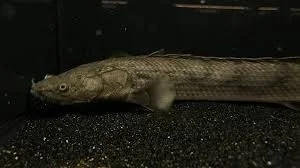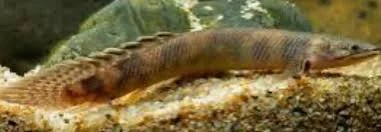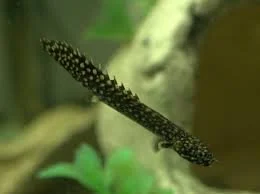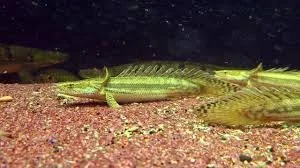 Image 1 of 1
Image 1 of 1


Bichir - Senegalus 2-2.5 in
Bichirs, also known as Polypterus, are ancient-looking fish that belong to the family Polypteridae. These unique fish require specific care to thrive in an aquarium. Here are the general requirements for keeping Bichirs:
Aquarium Size: Bichirs can grow quite large, with some species reaching lengths of over 2 feet (60 cm). Therefore, a spacious tank is essential. The minimum tank size recommended for a single Bichir is typically around 75 gallons (284 liters). Larger species or multiple Bichirs may require even larger tanks to provide adequate swimming space.
Water Parameters: Bichirs are generally hardy and can tolerate a range of water conditions. They prefer slightly acidic to neutral water with a pH level between 6.5 and 7.5. The water temperature should be maintained between 75-82°F (24-28°C). Ammonia, nitrite, and nitrate levels should be regularly monitored and kept at safe levels (0 ppm ammonia and nitrite, and low levels of nitrate).
Filtration: A reliable filtration system is crucial for maintaining excellent water quality. Bichirs are known to produce a fair amount of waste, so consider using a canister filter or a combination of mechanical, biological, and chemical filtration. The filter should be adequately sized for the tank and provide efficient water circulation. Regular maintenance and media cleaning are essential to ensure optimal filtration.
Lighting: Bichirs do not have specific lighting requirements. They are primarily nocturnal and appreciate subdued lighting conditions. Avoid intense lighting that may cause stress, but ensure the tank is adequately lit to observe their behavior and monitor their health.
Decorations: Bichirs prefer a setup that mimics their natural habitat, which often includes slow-moving or stagnant waters with dense vegetation, logs, and root structures. Provide them with ample hiding places, such as caves, PVC pipes, and large rocks. Live or artificial plants with sturdy roots can be incorporated, but Bichirs may uproot delicate plants.
Tank Mates: Bichirs are generally peaceful but may become aggressive towards smaller fish that can fit in their mouths. It is best to keep them in a species-specific or species-only tank. However, they can sometimes be compatible with larger, non-aggressive fish species that can tolerate their size and temperament. Tank mates should be carefully selected to avoid any potential aggression or fin nipping.
Feeding: Bichirs are carnivorous and require a diet primarily composed of meaty foods. Offer them a variety of high-quality, protein-rich foods such as pellets, frozen or live foods like bloodworms, brine shrimp, blackworms, and small fish. They may also accept freeze-dried foods, but these should be fed sparingly to maintain a balanced diet.
Bichirs, also known as Polypterus, are ancient-looking fish that belong to the family Polypteridae. These unique fish require specific care to thrive in an aquarium. Here are the general requirements for keeping Bichirs:
Aquarium Size: Bichirs can grow quite large, with some species reaching lengths of over 2 feet (60 cm). Therefore, a spacious tank is essential. The minimum tank size recommended for a single Bichir is typically around 75 gallons (284 liters). Larger species or multiple Bichirs may require even larger tanks to provide adequate swimming space.
Water Parameters: Bichirs are generally hardy and can tolerate a range of water conditions. They prefer slightly acidic to neutral water with a pH level between 6.5 and 7.5. The water temperature should be maintained between 75-82°F (24-28°C). Ammonia, nitrite, and nitrate levels should be regularly monitored and kept at safe levels (0 ppm ammonia and nitrite, and low levels of nitrate).
Filtration: A reliable filtration system is crucial for maintaining excellent water quality. Bichirs are known to produce a fair amount of waste, so consider using a canister filter or a combination of mechanical, biological, and chemical filtration. The filter should be adequately sized for the tank and provide efficient water circulation. Regular maintenance and media cleaning are essential to ensure optimal filtration.
Lighting: Bichirs do not have specific lighting requirements. They are primarily nocturnal and appreciate subdued lighting conditions. Avoid intense lighting that may cause stress, but ensure the tank is adequately lit to observe their behavior and monitor their health.
Decorations: Bichirs prefer a setup that mimics their natural habitat, which often includes slow-moving or stagnant waters with dense vegetation, logs, and root structures. Provide them with ample hiding places, such as caves, PVC pipes, and large rocks. Live or artificial plants with sturdy roots can be incorporated, but Bichirs may uproot delicate plants.
Tank Mates: Bichirs are generally peaceful but may become aggressive towards smaller fish that can fit in their mouths. It is best to keep them in a species-specific or species-only tank. However, they can sometimes be compatible with larger, non-aggressive fish species that can tolerate their size and temperament. Tank mates should be carefully selected to avoid any potential aggression or fin nipping.
Feeding: Bichirs are carnivorous and require a diet primarily composed of meaty foods. Offer them a variety of high-quality, protein-rich foods such as pellets, frozen or live foods like bloodworms, brine shrimp, blackworms, and small fish. They may also accept freeze-dried foods, but these should be fed sparingly to maintain a balanced diet.





